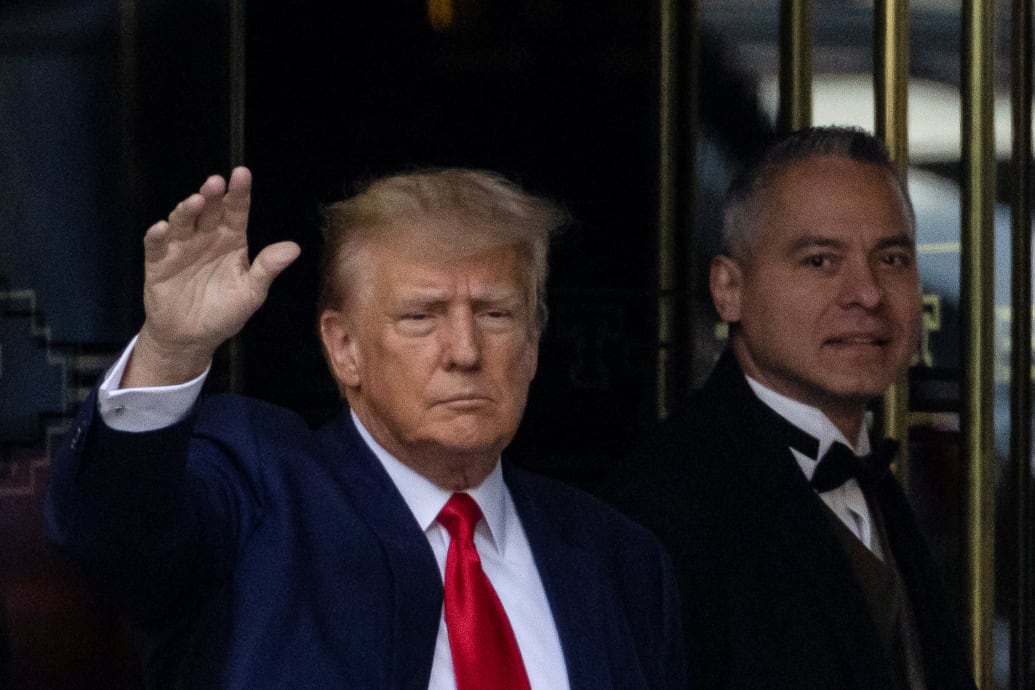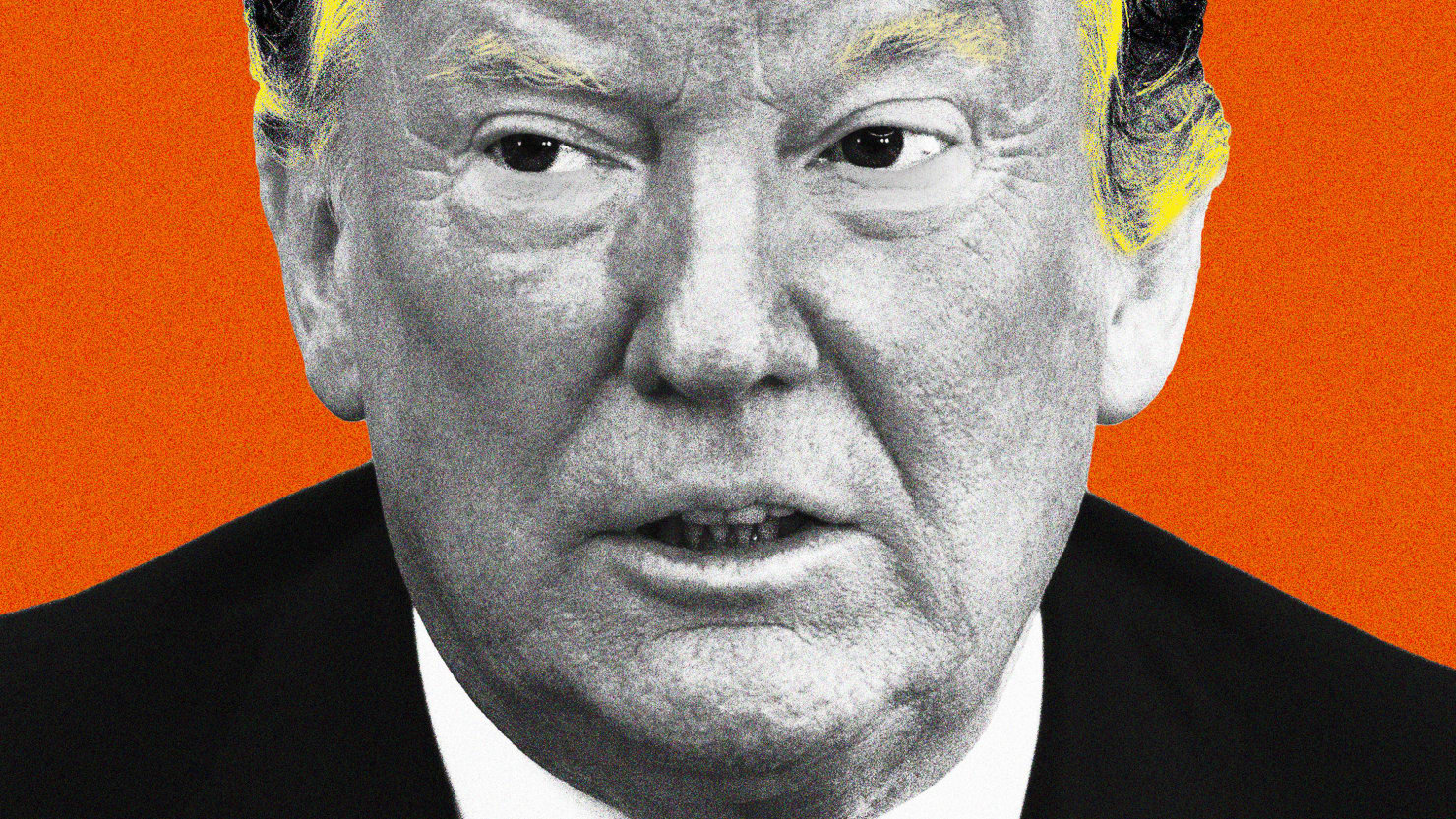After decades of evading legal repercussions, former President Donald Trump was arrested and arraigned on Tuesday in the city that built him, appearing before a Manhattan criminal court where he pleaded not guilty to 34 felony counts.
Trump faces a potential Jan. 2024 criminal trial over falsifying business records in order to conceal information from voters and lie to the IRS, marking a new chapter of his life where he’ll formally be under the cloud of criminal charges.
The ex-president was released from custody almost exactly two hours after he showed up at Manhattan criminal court—at 3:25 p.m.—about 57 minutes after he entered the courtroom for his arraignment. While he was expected to speak to reporters at the courthouse, Trump opted to remain silent before his scheduled press conference later Tuesday night back at Mar-a-Lago.
Trump remained deflated and visibly perturbed in the courtroom, as he was reminded to tamp down his violent rhetoric.
In a pivotal moment, Justice Juan Merchan cautioned Trump to avoid inciting violence—to which Trump merely grumbled.
“If you’re disruptive…I do have the authority to remove you from the courtroom. Do you understand that?” the judge asked him, repeatedly referring to him as Mr. Trump throughout the proceeding.
“I do,” Trump whispered.
Throughout the 57-minute-long arraignment, Trump kept his hands under the desk while slouching, or folded his arms while looking uncomfortable.
During the proceedings, Manhattan prosecutors stressed the danger of Trump’s aggressive comments to supporters that targeted District Attorney Alvin Bragg—and even the judge himself—pointing out that Trump had posted an image online positioned to show him holding a bat, threateningly, over Bragg’s head.
Assistant District Attorney Christopher Conroy said Trump had made comments “threatening our city, our justice system, our courts,” and referenced ‘World War III,’ and ‘death and destruction.’”
In response, Trump defense lawyer Todd Blanche argued “the president has free speech rights. He is absolutely frustrated, upset, and believes there is a grave injustice with him being in this courtroom today.”
The judge shot back: “Well, certainly, Mr. Trump has rights.” But he also noted the former president’s frustration was no excuse.
“Please refrain from making statements that are likely to incite violence or create civil unrest,” Merchan warned Trump, noting that this was merely a request, not an order.
The judge cautioned that he would consider further measures if necessary, alluding to the possibility of holding Trump in contempt of court—a finding that legal experts say could result in him being fined or even imprisoned.
Trump’s indictment was unsealed shortly after he left the courthouse Tuesday.

USA-TRUMP/
REUTERS/Carlos Barria
At 1:23 p.m. on Tuesday, Trump’s motorcade arrived at a closed-off street outside the courthouse entrance. He walked out of an SUV alone. He waved to the sizable crowd that had gathered outside the courthouse. And then he slowly walked into the courthouse, where he was processed and arraigned over the next two hours.
Just before he arrived at the courthouse, Trump posted to his social media platform, Truth Social, that heading to the building seemed “so SURREAL.”
“WOW. They are going to ARREST ME. Can’t believe this is happening in America,” he wrote.
Trump spent much of the morning posting to Truth Social, going after the judge presiding over his case and claiming that “RADICAL LEFT DEMOCRATS HAVE CRIMINALIZED THE JUSTICE SYSTEM.”
The case is already making history, as the real estate tycoon who turned politics upside down is now the first ever former American president to face criminal charges—just as he ramps up his bid to return to the White House in 2024.
On Monday, Trump flew aboard his private Boeing 757 jet—“Trump Force One”—from his Florida oceanside estate at Mar-a-Lago to Queens on Monday, staying the night at his Trump Tower apartment in Manhattan. He traveled south Tuesday morning by motorcade to the downtown courthouse, where he was booked and then brought before a judge for his arraignment on dozens of charges.
Those charges are centered around the way he paid two women to keep them quiet about sexual affairs with him—routing the payments through the Trump Organization and his lawyer, Michael Cohen—in an attempt to keep it secret before the 2016 presidential election. Although Cohen went to federal prison over the ordeal in 2019, the feds never charged Trump, who was still president at the time.
It was up to local law enforcement to pick up the slack.
New York County District Attorney Alvin Bragg Jr. is leading the first ever criminal action against the former president with an indictment that follows a nearly four-year investigation into Trump’s business practices and hush money payments that started with his predecessor, Cy Vance Jr. The sprawling probe involved a bitter court battle to access Trump’s personal tax records that twice reached the U.S. Supreme Court, generated a parallel civil investigation by the New York Attorney General into his numerous lies about real estate valuations, and recently resulted in a conviction against Trump’s private companies for tax fraud.
Bragg was emboldened by his successful trials against the Trump Corp., Trump Payroll Corp., and their chief financial office, Allen Weisselberg, who is now serving time behind bars at New York’s dreaded Rikers Island jail.
So far, it appears that Weisselberg has refused to flip on his former boss—denying prosecutors the ability to rely on him to document the way Trump schemed to structure the hush money deals in a way that would save him from public disgrace. However, Cohen, now out of federal prison, has become a key witness who was willing to describe how he fronted the $130,000 payment to the porn star Stormy Daniels then got reimbursed $420,000 in nearly a dozen payments over the next year—a scheme that involved Trump lying on business records.
In recent weeks, the Manhattan grand jury that indicted Trump also heard testimony from David Pecker, the National Enquirer executive who fronted $150,000 and helped Trump by agreeing to “catch-and-kill” a similar tell-all story by Playboy model Karen McDougal.
Trump for months has decried the New York investigation as a “political prosecution,” and on Monday night, he accused the DA of leaking details about the indictment, puzzlingly calling for Bragg to “indict himself.”
In recent days, however, he has continued his penchant for whipping up his devout MAGA supporters, warning that any law enforcement action against him would result in “potential death and destruction” nationwide—echoing his violent rhetoric that led a crowd of his followers to attack Congress on Jan. 6, 2021, in a desperate bid to remain in the White House after losing the 2020 election.
Outside the Manhattan courthouse on Tuesday morning, Trump supporters wore their trademark red “Make America Great Again” caps, heckled journalists who have been seen as the politician’s foil for documenting his lies, and waved a massive flag that read “Trump or death.” Meanwhile, a separate band of protesters cheered for Trump’s arrest and waved flags celebrating his indictment.
At an afternoon press conference shortly after the arraignment, New York County District Attorney Alvin Bragg Jr. explained that Trump’s repeated lying on business records rose to the level of multiple felonies because they were tied to underlying state crimes.
He noted that New York “makes it a crime to conspire to promote a candidacy by unlawful means.” And added that Trump’s “scheme” was structured to allow Cohen to claim the repayment as a high enough batch of income to more than compensate him for the deal after taxes. While Bragg’s office was initially reluctant to file the criminal case—which would have remained as lower level misdemeanors without underlying crimes—his presentation on Tuesday hinted at how his office managed to overcome an obstacle that had bedeviled prosecutors who were previously on that team.
Bragg justified the historic white collar criminal case, noting that Trump shouldn’t be treated better than any other wealthy business owner who profits from their lies.
“True and accurate business records are important everywhere. They are all the more important in Manhattan, the financial center of the world,” Bragg said, calling this an extension of the office’s long history of cracking down on “white collar crime.”
This post originally appeared on and written by:
Jose Pagliery
The Daily Beast 2023-04-04 14:54:00

